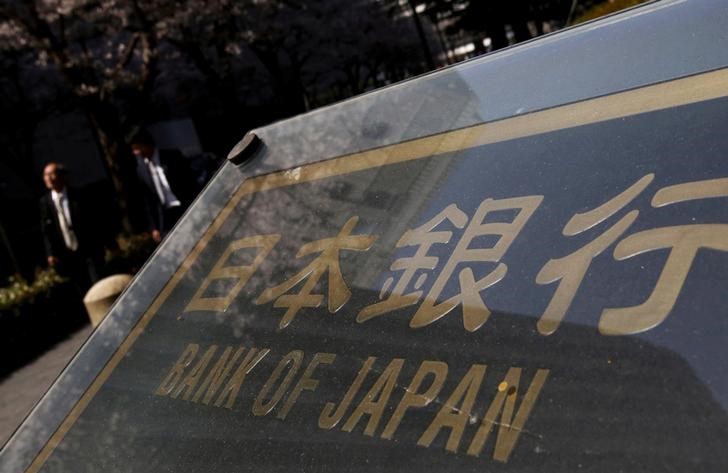By Leika Kihara
TOKYO (Reuters) – The Bank of Japan has already prepared a preliminary outline of a “comprehensive” review of its policies due next month that will maintain a pledge to hit its 2 percent inflation target as soon as possible, sources familiar with its thinking said. In the draft, the BOJ identifies sharp falls in oil prices, a prolonged hit to growth from a sales tax hike in 2014 and Japan’s inability to shake off its deflationary mindset as hampering achievement of its inflation target, the sources said. By blaming external factors for keeping inflation subdued, the BOJ could use the review to defend its policy framework from rising criticism that three years of heavy money printing had failed to achieve its price target, they added. “The outcome will probably show that QQE (quantitative and qualitative easing) and an expansion of it in 2014 have been successful,” said one of the sources, on condition of anonymity due to the sensitivity of the matter. The BOJ’s announcement last month of the review triggered the worst sell-off in government bonds in more than three years, as some traders speculated that the central bank feared it was being left with a dwindling policy tool kit and so might begin tapering asset purchases. Other market players bet the assessment could prompt the BOJ to shift to a more radical policy like “helicopter money,” under which it monetises government debt by accepting perpetual bonds. For such investors, an assessment defending the existing policy could be a disappointment, unless it is accompanied by an expansion of QQE or a deepening of negative interest rates.
The preliminary outline appears to make no direct recommendations on the future direction of monetary policy, though the general tone would suggest that a tapering of the BOJ’s massive stimulus program is unlikely, the sources said. Several issues have yet to be finalised due to disagreements in the board, such as whether January’s decision to adopt negative rates would help boost inflation, they added.
According to the sources, the review would also look at why negative rates have pushed down yields so much for as long as 20- and 30-year bonds, and how damaging the subsequent flattening of the yield curve could be on financial institutions’ profits. NO CONSENSUS ON POLICY
The draft is subject to change depending on debate by the nine-member board. A BOJ spokesman declined to comment.
Officials had been drafting the outline weeks before the July announcement, the sources said, suggesting that the review would be more a defense of the status quo rather than a radical make-over of the existing policy framework. The BOJ eased policy in July but not as aggressively as financial markets had expected, sending the yen higher and triggering a sell-off in the Tokyo stock market.
At the July meeting, it also said it would conduct a thorough assessment at its next rate review on Sept. 20-21 of the pros and cons of its stimulus program, which combines negative rates with a huge asset-buying scheme – dubbed QQE – adopted in 2013. BOJ Governor Haruhiko Kuroda has said the review would focus on ways to accelerate hitting his price target, suggesting that the outcome would not to lead to an unwinding of stimulus.
“It would be more about refining the strategy for achieving 2 percent inflation,” a second source said. “It won’t result in ditching negative rates or tapering bond purchases.” With the September rate review still six weeks ahead, however, there is no consensus on how the assessment could affect the direction of monetary policy, the sources said.
“The assessment will probably be phrased in a way that leaves the BOJ with plenty of flexibility on what to do in terms of monetary policy decisions,” a third source said.
(Additional reporting by Sumio Ito and Yoshifumi Takemoto; Editing by Kim Coghill and Mike Collett-White)
Exclusive: BOJ review likely to defend massive stimulus program – sources

By Leika Kihara
















